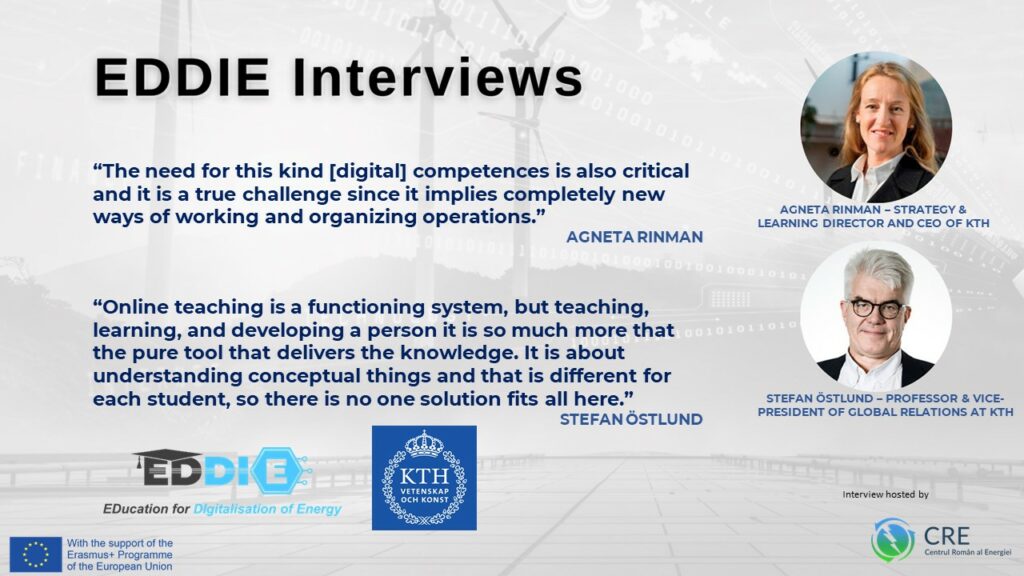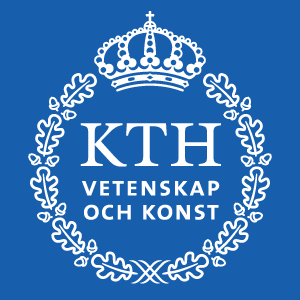5th guest – Partner KTH, Royal Institute of Technology.
Stefan Östlund – Professor & Vice-President of Global Relations at KTH
Agneta Rinman – Strategy & Learning Director and CEO of KTH

Mister. Östlund, your teaching experience summarizes approximately 30 years, therefore, how do you perceive the digitalization of the energy sector?
It is one of the typical questions when you try to develop a system and merge different technologies. I know, as a power engineer myself, that it is very important to have the fundamental knowledge and to be skilled in the physics behind it. On the other hand, you are supposed to use state-of the art tools that are developing very quickly like digital ones. So, the conflict of time is always to have both. Some people tend to understand their background field, the background that they are coming from, and have been able to learn the other ones. But this is time consuming, and many do not manage to do this, maybe due to lack of time, and therefore, finding this quick mix of approaching the topic from two sides, the energy side, the physics side, and the digital side is very challenging actually.
Mister. Östlund, what are the challenges that the Sweden teaching system is facing/ have faced when the courses moved online last year (at the beginning of pandemic)?
Online teaching is working acceptable well. You can have lectures, you can have seminars, everything looks very neat. It is a functioning system, but teaching, learning, and developing a person is so much more that the pure tool that delivers the knowledge. It is about understanding conceptual things and each student learn differently so there is no one solution fits all here.
Teaching means growing, you grow as a person, you develop your skills, and some people understands very quickly new concepts, some people understand them a little bit slower. So, to cover all student’s needs you need to interact with the students also in online teaching. This lack of interaction is the drawback of online teaching. The digital world is a very well-prepared world; however, it is sometimes pretty boring to teach in front of a screen.
Mis. Rinman, the digitalisation previously addressed by Mr. Östlund, it’s a transition process and based on your experience in strategy and learning, what are the priorities (at the European level) in the technical education system?
The organisation that I represent provides learnings for professionals, therefore my answer is based on the needs we see in industry.
On one hand, there is the fast development of powerful technologies, as Mr. Östlund mentioned for instance AI, which is critical to be on top of and have sufficient competence in.
On the other hand, the energy system is undergoing a transformation with rapid development of for example intermittent energy, new energy solutions based on storage possibilities and the need to become more sustainable and meeting the targets of the Paris agreement – all of this without compromising a secure and robust energy grid system. So, where previously efficiency of the grid and in the distribution were key, now flexible small-scale solutions in more distributed and multi-autonomous systems are becoming more and more important.
That is why the need for this kind of competence also is critical, and it is a true challenge since it implies completely new ways of working and organizing operations.
Mis. Rinman, you are involved in EDDIE WP5 related to Blueprint; therefore, can you share your vision for a successful framework?
Work-package 5 is still in an initial stage and the whole idea is to collaboratively create the successful framework or the blueprint. So far, a process for designing and delivering educational programs have been created and discussed, from which we intend to derive the method to apply.
However, the team here at KTH envision developing a framework that consists of templates for 10 to 12 education programmes in different formats addressing competence- and skills needs at different levels within the European Energy Sector. And the reason why my colleagues and I are thrilled to be part of the EDDIE project is this focus on the current competence- & skills needs driven by digitalisation and that these needs will be analysed in a structured and granular way giving both industry and educators a shared view. Of course, we strive for and hope that the framework will be widely adapted and support continuous cooperation between industry and educators.
Mis. Rinman, you are involved in EDDIE WP5 related to Blueprint; therefore, can you share your vision for a successful framework?
Ms. Rinman: My learning grounds and my passion are horses and horseback riding. I get a lot of inspiration from learning and I like the way Mr. Östlund talked about how education make people grow.
Mr. Östlund:I am pretty conventional, and I like sports, I play a lot of golf, I enjoy food and especially wine – I’m a collector.




